Unit 6 Do you like bananas?导学案(5课时)
文档属性
| 名称 | Unit 6 Do you like bananas?导学案(5课时) |
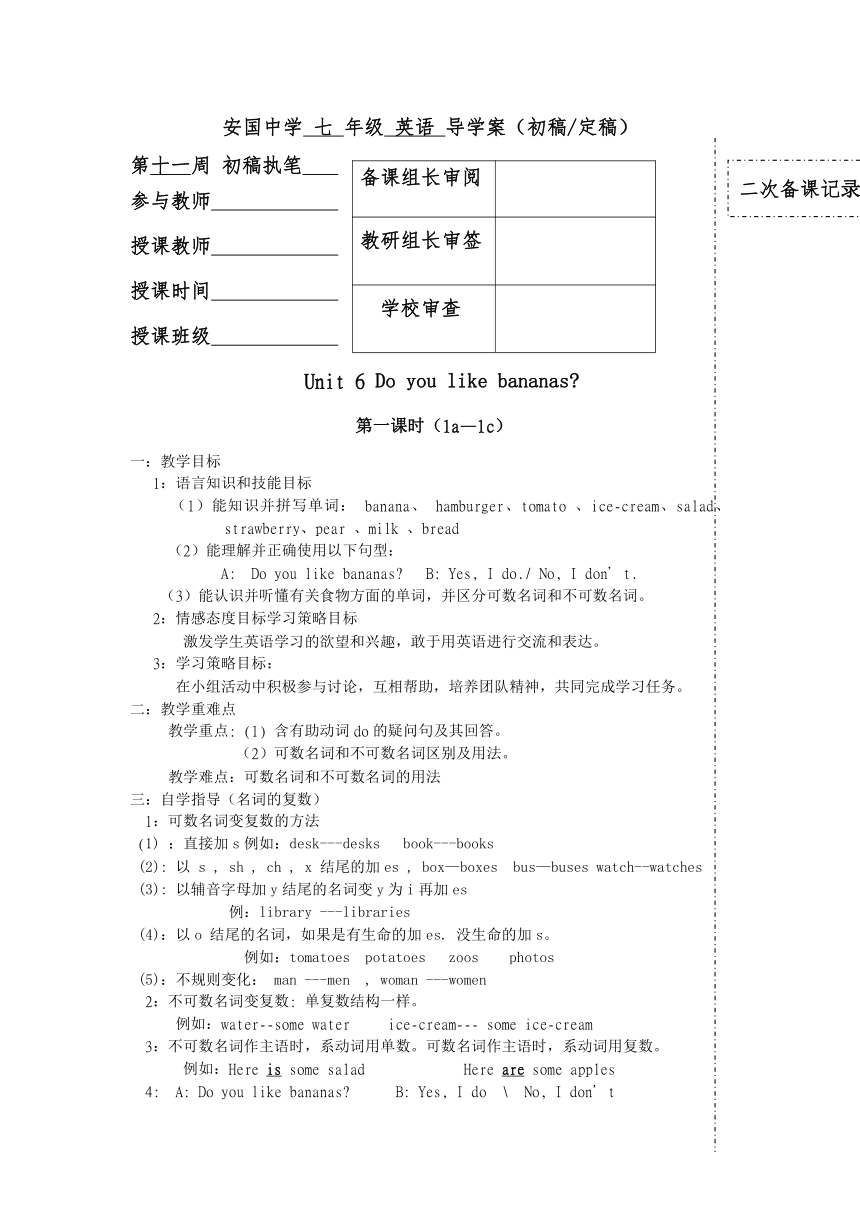
|
|
| 格式 | zip | ||
| 文件大小 | 26.3KB | ||
| 资源类型 | 教案 | ||
| 版本资源 | 人教新目标(Go for it)版 | ||
| 科目 | 英语 | ||
| 更新时间 | 2013-11-07 00:00:00 | ||
图片预览

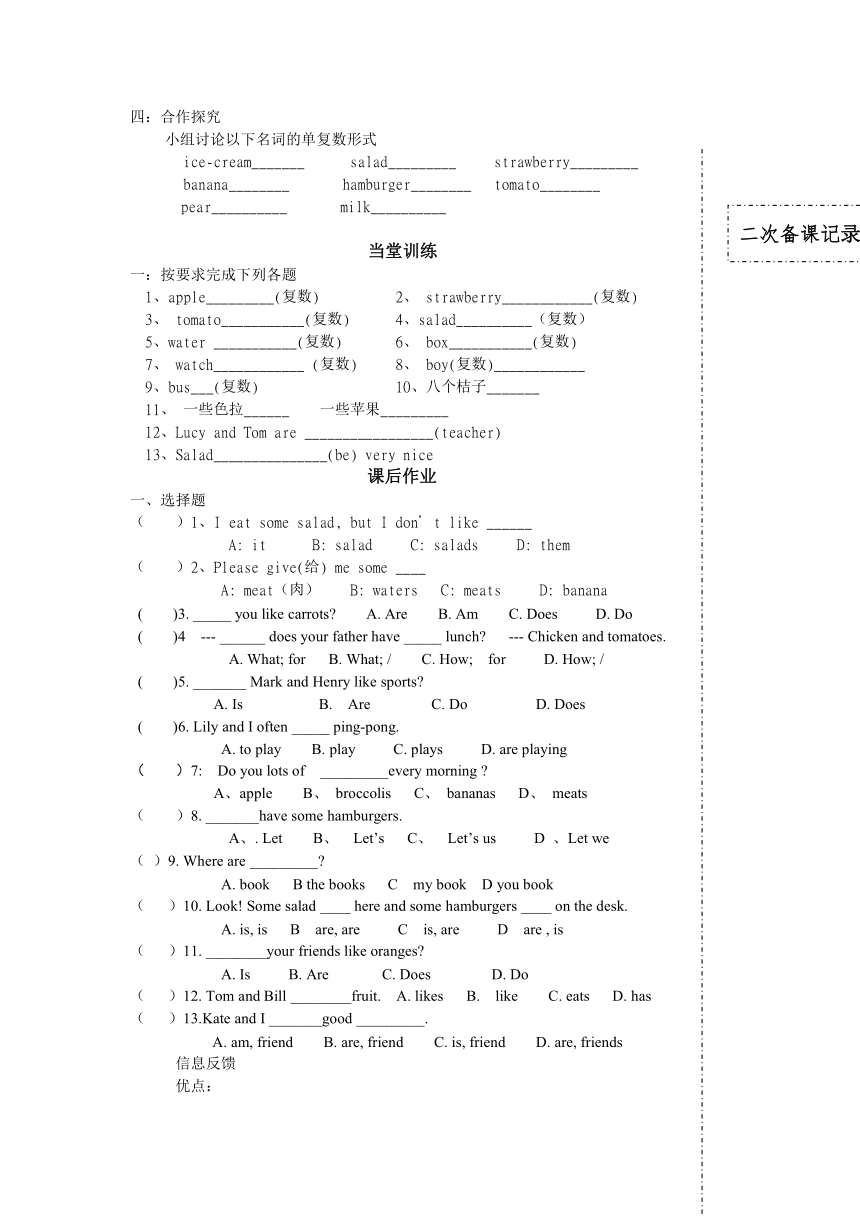
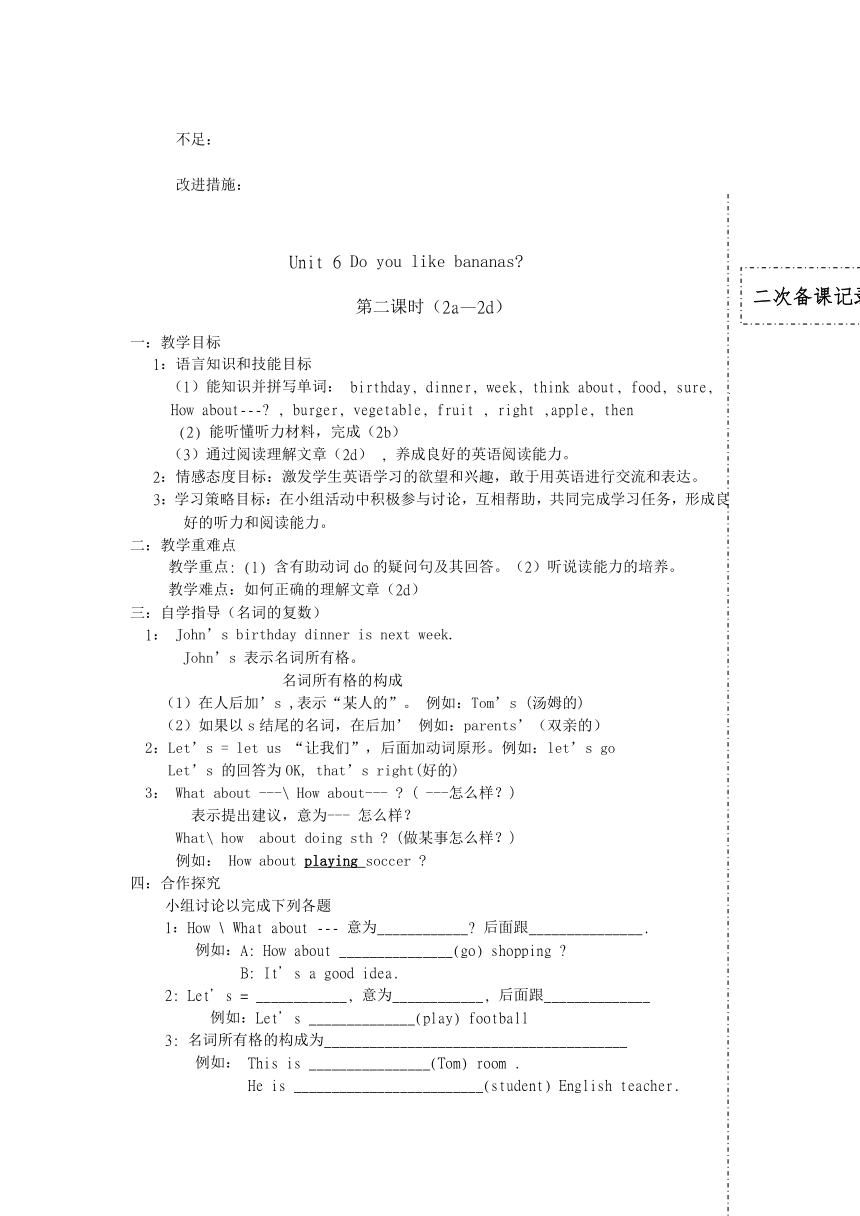
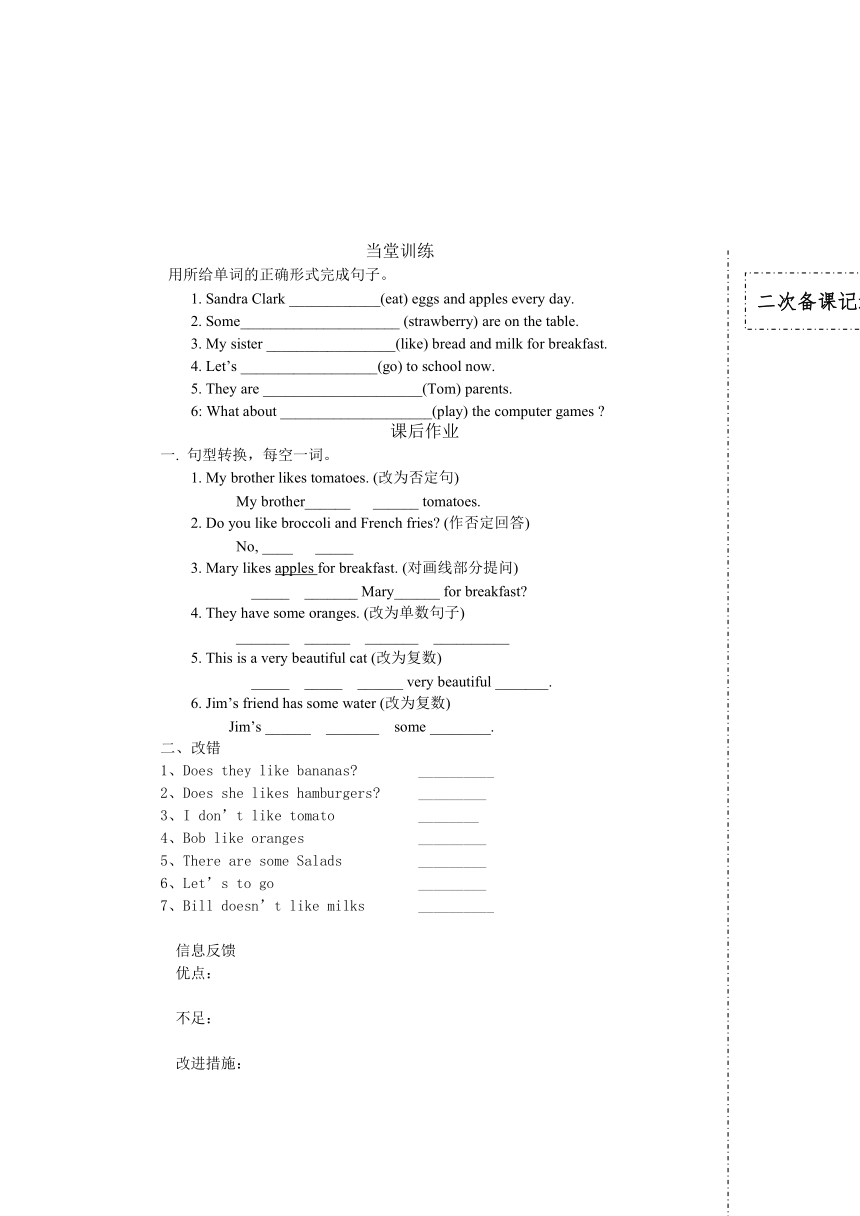
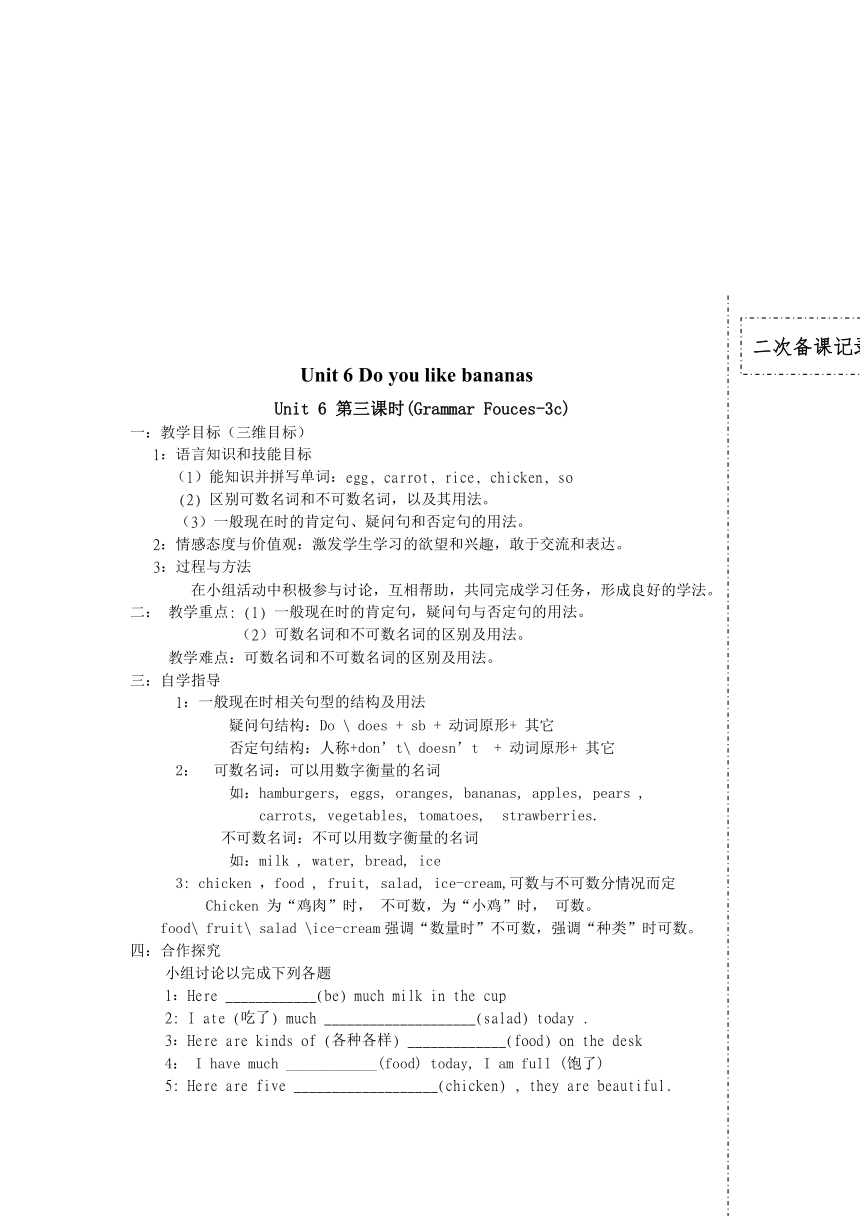
文档简介
安国中学 七 年级 英语 导学案(初稿/定稿)
备课组长审阅
教研组长审签
学校审查
第十一周 初稿执笔
参与教师
授课教师
授课时间
授课班级
Unit 6 Do you like bananas
第一课时(1a—1c)
一:教学目标
1:语言知识和技能目标
(1)能知识并拼写单词: banana、 hamburger、tomato 、ice-cream、salad、strawberry、pear 、milk 、bread
(2)能理解并正确使用以下句型:
A: Do you like bananas B: Yes, I do./ No, I don’t.
(3)能认识并听懂有关食物方面的单词,并区分可数名词和不可数名词。
2:情感态度目标学习策略目标
激发学生英语学习的欲望和兴趣,敢于用英语进行交流和表达。
3:学习策略目标:
在小组活动中积极参与讨论,互相帮助,培养团队精神,共同完成学习任务。
二:教学重难点
教学重点: (1) 含有助动词do的疑问句及其回答。
(2)可数名词和不可数名词区别及用法。
教学难点:可数名词和不可数名词的用法
三:自学指导(名词的复数)
1:可数名词变复数的方法
(1) :直接加s例如:desk---desks book---books
(2): 以 s , sh , ch , x 结尾的加es , box—boxes bus—buses watch--watches
(3): 以辅音字母加y结尾的名词变y为i再加es
例:library ---libraries
(4):以o 结尾的名词,如果是有生命的加es. 没生命的加s。
例如:tomatoes potatoes zoos photos
(5):不规则变化: man ---men , woman ---women
2:不可数名词变复数: 单复数结构一样。
例如:water--some water ice-cream--- some ice-cream
3:不可数名词作主语时,系动词用单数。可数名词作主语时,系动词用复数。
例如:Here is some salad Here are some apples
4: A: Do you like bananas B: Yes, I do \ No, I don’t
四:合作探究
小组讨论以下名词的单复数形式
ice-cream_______ salad_________ strawberry_________
banana________ hamburger________ tomato________
pear__________ milk__________
当堂训练
一:按要求完成下列各题
1、apple_________(复数) 2、 strawberry____________(复数)
3、 tomato___________(复数) 4、salad__________(复数)
5、water ___________(复数) 6、 box___________(复数)
7、 watch____________ (复数) 8、 boy(复数)____________
9、bus___(复数) 10、八个桔子_______
11、 一些色拉______ 一些苹果_________
12、Lucy and Tom are _________________(teacher)
13、Salad_______________(be) very nice
课后作业
一、选择题
( )1、I eat some salad, but I don’t like ______
A: it B: salad C: salads D: them
( )2、Please give(给) me some ____
A: meat(肉) B: waters C: meats D: banana
( )3. _____ you like carrots A. Are B. Am C. Does D. Do
( )4 --- ______ does your father have _____ lunch --- Chicken and tomatoes.
A. What; for B. What; / C. How; for D. How; /
( )5. _______ Mark and Henry like sports
A. Is B. Are C. Do D. Does
( )6. Lily and I often _____ ping-pong.
A. to play B. play C. plays D. are playing
( )7: Do you lots of _________every morning
A、apple B、 broccolis C、 bananas D、 meats
( )8. _______have some hamburgers.
A、. Let B、 Let’s C、 Let’s us D 、Let we
( )9. Where are _________
A. book B the books C my book D you book
( )10. Look! Some salad ____ here and some hamburgers ____ on the desk.
A. is, is B are, are C is, are D are , is
( )11. ________your friends like oranges
A. Is B. Are C. Does D. Do
( )12. Tom and Bill ________fruit. A. likes B. like C. eats D. has
( )13.Kate and I _______good _________.
A. am, friend B. are, friend C. is, friend D. are, friends
信息反馈
优点:
不足:
改进措施:
Unit 6 Do you like bananas
第二课时(2a—2d)
一:教学目标
1:语言知识和技能目标
(1)能知识并拼写单词: birthday, dinner, week, think about, food, sure,
How about--- , burger, vegetable, fruit , right ,apple, then
(2) 能听懂听力材料,完成(2b)
(3)通过阅读理解文章(2d) , 养成良好的英语阅读能力。
2:情感态度目标:激发学生英语学习的欲望和兴趣,敢于用英语进行交流和表达。
3:学习策略目标:在小组活动中积极参与讨论,互相帮助,共同完成学习任务,形成良好的听力和阅读能力。
二:教学重难点
教学重点: (1) 含有助动词do的疑问句及其回答。(2)听说读能力的培养。
教学难点:如何正确的理解文章(2d)
三:自学指导(名词的复数)
1: John’s birthday dinner is next week.
John’s 表示名词所有格。
名词所有格的构成
(1)在人后加’s ,表示“某人的”。 例如:Tom’s (汤姆的)
(2)如果以s结尾的名词,在后加’ 例如:parents’(双亲的)
2:Let’s = let us “让我们”,后面加动词原形。例如:let’s go
Let’s 的回答为OK, that’s right(好的)
3: What about ---\ How about--- ( ---怎么样?)
表示提出建议,意为--- 怎么样?
What\ how about doing sth (做某事怎么样?)
例如: How about playing soccer
四:合作探究
小组讨论以完成下列各题
1:How \ What about --- 意为____________ 后面跟_______________.
例如:A: How about _______________(go) shopping
B: It’s a good idea.
2: Let’s = ____________, 意为____________, 后面跟______________
例如:Let’s ______________(play) football
3: 名词所有格的构成为________________________________________
例如: This is ________________(Tom) room .
He is _________________________(student) English teacher.
当堂训练
用所给单词的正确形式完成句子。
1. Sandra Clark ____________(eat) eggs and apples every day.
2. Some_____________________ (strawberry) are on the table.
3. My sister _________________(like) bread and milk for breakfast.
4. Let’s __________________(go) to school now.
5. They are _____________________(Tom) parents.
6: What about ____________________(play) the computer games
课后作业
一. 句型转换,每空一词。
1. My brother likes tomatoes. (改为否定句)
My brother______ ______ tomatoes.
2. Do you like broccoli and French fries (作否定回答)
No, ____ _____
3. Mary likes apples for breakfast. (对画线部分提问)
_____ _______ Mary______ for breakfast
4. They have some oranges. (改为单数句子)
_______ ______ _______ __________
5. This is a very beautiful cat (改为复数)
_____ _____ ______ very beautiful _______.
6. Jim’s friend has some water (改为复数)
Jim’s ______ _______ some ________.
二、改错
1、Does they like bananas __________
2、Does she likes hamburgers _________
3、I don’t like tomato ________
4、Bob like oranges _________
5、There are some Salads _________
6、Let’s to go _________
7、Bill doesn’t like milks __________
信息反馈
优点:
不足:
改进措施:
Unit 6 Do you like bananas
Unit 6 第三课时(Grammar Fouces-3c)
一:教学目标(三维目标)
1:语言知识和技能目标
(1)能知识并拼写单词:egg, carrot, rice, chicken, so
(2) 区别可数名词和不可数名词,以及其用法。
(3)一般现在时的肯定句、疑问句和否定句的用法。
2:情感态度与价值观:激发学生学习的欲望和兴趣,敢于交流和表达。
3:过程与方法
在小组活动中积极参与讨论,互相帮助,共同完成学习任务,形成良好的学法。
二: 教学重点: (1) 一般现在时的肯定句,疑问句与否定句的用法。
(2)可数名词和不可数名词的区别及用法。
教学难点:可数名词和不可数名词的区别及用法。
三:自学指导
1:一般现在时相关句型的结构及用法
疑问句结构:Do \ does + sb + 动词原形+ 其它
否定句结构:人称+don’t\ doesn’t + 动词原形+ 其它
2: 可数名词:可以用数字衡量的名词
如:hamburgers, eggs, oranges, bananas, apples, pears ,
carrots, vegetables, tomatoes, strawberries.
不可数名词:不可以用数字衡量的名词
如:milk , water, bread, ice
3: chicken ,food , fruit, salad, ice-cream,可数与不可数分情况而定
Chicken 为“鸡肉”时, 不可数,为“小鸡”时, 可数。
food\ fruit\ salad \ice-cream强调“数量时”不可数,强调“种类”时可数。
四:合作探究
小组讨论以完成下列各题
1:Here ____________(be) much milk in the cup
2: I ate (吃了) much ____________________(salad) today .
3:Here are kinds of (各种各样) _____________(food) on the desk
4: I have much ____________(food) today, I am full (饱了)
5: Here are five ___________________(chicken) , they are beautiful.
6:I like eating _______________(chicken) very much .
当堂训练
一:写出下列单词的复数形式
egg__________ tomato__________ family__________
pear__________ class__________ ball__________
radio__________ ball__________ player__________
boy__________ clock__________ watch__________
water__________ salad __________ milk __________
课后作业
一:选择题
( )1:-Do you like _____ ---Yes, I do
A: apples B: apple C: a apple D: salads
( )2: Bill____ eggs and bread.
A: like B: likes C: don’t D: doesn’t like
( )3: ________ likes ice-cream
A: My sister B: His brothers C: Your friends D: I
( )4: --____Gina like milk --No, she doesn’t
A: Do B: Does C: Is D: Are
( )5: --What about ____ --Sounds good
A: rices and eggs B: rice and eggs C: rice and egg D: rices and egg
二:句型转换
1: I like blue and white ( 改为一般疑问句)
____ ____ ____ blue and white
2: Sally likes ice-cream very much ( 改为否定句)
Sally ______ _______ ice-cream very much
3: They have some bread for breakfast this morning ( 向划线部分提问)
____ _____ they have for breakfast this morning
4: It is an egg (改为复数句) ____ are_____.
5: The apples are on the table(向划线部分提问) _____ _____ the apples
三:根据汉语提示完成句子。
1:你喜欢冰激凌吗? ______ You like _______
2: Jenny 有5个大苹果,你呢?
Jenny __________ five big apples. ______ about you
3: Mr. Smith 非常喜欢中国食物 Mr Smith ______Chinese______ very much
4: 让我们考虑一下蔬菜汤吧 Let’s _____ _____ vegetable soup
5: ---那些是什么?----是西红柿。 ---What are ______ --- They are _________
信息反馈
优点:
不足:
改进措施:
Unit 6 Do you like bananas
第四课时(Section B 1a-1e)
一:教学目标
1:语言知识和技能目标
(1)能识记并拼写单词: breakfast, lunch
(2)巩固一般现在时疑问句的结构及用法。
(3)进一步学习和巩固可数名词和不可数名词。
(4)培养良好的听力方法和技能。
2:情感态度目标
激发学生英语学习的欲望和兴趣,敢于用英语进行交流和表达。
3:过程与方法目标:
在小组活动中积极参与讨论,互相帮助,培养团队精神,共同完成学习任务。
培养良好的听说技能和方法
二:教学重难点
教学重点: (1) 含有助动词do的疑问句及其回答。
(2)听力练习。
教学难点:培养良好的听说方法和技能。
三:自学指导(名词的复数)
1: 本单元常用可数名词和不可数名词
(1) 可数名词:可以用数字衡量的名词
如:hamburgers, eggs, oranges, bananas, apples, pears ,
carrots, vegetables, tomatoes, strawberries.
(2) 不可数名词:不可以用数字衡量的名词
如:milk , water, bread, rice
(3)chicken ,food , fruit, salad, ice-cream,可数与不可数分情况而定
Chicken 为“鸡肉”时, 不可数,为“小鸡”时, 可数。
food\ fruit\ salad \ice-cream强调“数量时”不可数,强调“种类”时可数。
2: 重点句型
A: Does Tom like carrots
B: Yes, he does \ No, he doesn’t
A: Do they like apples
B: Yes, they do \ No, they don’t
四:合作探究
小组讨论以写出常用的可数名词(要求写出复数)和不可数名词。
可数:___________________________________________________________________
不可数:_________________________________________________________________
当堂训练
一:单项选择题
( )1 Do you have _________every morning
A. apple B chickens C bananas D salads
( )2. ________your friend like English A. Does B Do C Is D Are
( )3.—Let’s play tennis. --______________.
A: That sound good. B: That sounds good.
C : That sound good D: That’s sound good
( )4. My mother _____apples, but she ______bananas.
A. like , doesn’t likes B. likes, doesn’t like
C. likes, like D. like, likes
( )6.He _____sports, he only _______them on TV.
A. don’t play , watch B doesn’t play , watch
C. not play , watches D doesn’t play , watches
( )7. Well, let’s _______TV.
A. watch B watches C to watch D watching
( )8. What _______you _______for lunch
A. are, have B does ,has C do , has D do, have
( )9. Bob ______like orange. A. doesn’t B don’t C not D isn’t
( )10. ________your friends like oranges
A. Is B. Are C. Does D. Do
( )11. Tom and Bill ________fruit. A. likes B. like C. eats D. has
( )12.Kate and I _______good _________.
A. am, friend B. are, friend C. is, friend D. are, friends
二:.按要求改写句子
1. Linda and Tom like French fries. (改成否定句)
They _______ _______French fries.
2. Does Tom like eggs for breakfast (否定回答) _______, _______ _______.
3. She doesn’t have lunch. (变肯定句) She _______ lunch.
4. My teacher plays basketball. (改一般疑问句)
_______ your teacher _______ basketball
5. We play volleyball. (变成由Let开头的祈使句) _______ _______volleyball.
三、每句有一处错误,找出并改正。
1、Many people like egg for breakfast. _______
2、Does she likes carrots _______
3、They doesn’t like vegetables.
4、Does the boy has a computer
5、Here is my brother and sister.
信息反馈
优点:
不足:
改进措施:
Unit 6 Do you like bananas
第五课时(Section B 2a-2c)
一:教学目标
1:语言知识和技能目标
(1)识记并拼写单词: star, eat, well , habit, healthy , really , question, want , be fat
(2)读懂文章(2b),获取信息完成3c
(3)培养良好的阅读能力。
2:情感态度目标
激发学生阅读和理解文章的能力,激发兴趣,敢于交流和表达。
3:过程与方法目标
1:通过学习,掌握中国不同地区饮食文化及中西方不同的饮食文化
2:学会合作学习,努力开拓课程资源
二:教学重难点
教学重点: 阅读并理解文章2b,获取信息完成3c
教学难点:文章中重点句子的应运和学习
三:自学指导
1: want to do(想要做某事)
例如: I want to play computer games with my friends
2: what \ how about ---的用法
提出建议的表达,意为“做---怎么样啊?”
(1)How \ What about + sth ( 物)
How \ what about some bread for breakfast . ( 早餐吃点面包怎么样?)
(2)How \ What about doing sth ( 做某事怎么样?)
How \ What about going shopping
3: I like chicken for breakfast \ lunch \dinner (我喜欢早\午\晚餐吃鸡肉)
For为介词,后接名词或代词,意为“至于,对于---而言”
四:合作探究
按要求,补全句子。
1:A:你早餐吃什么?
What do you have _____ ______
B: 我早餐吃一些面包
I ______some ________for breakfast
2: 你长大之后想当一名老师吗?
DO you want _____ ______(be) a teacher when you grow up
3: --- 一块看电视怎么样?
--- 听起来很好
A: What\ How about___________(watch) TV
B: That __________(sound) good.
当堂训练
一、用所给词的正确形式填空
1 I like some___________(tomato) for dinner .Joe and Ann________(like)apples.
2.My father _______(not has )a basketball. But he_____(have) a soccer ball.
3. I like strawberry ice cream, but I don’t like_______ ( strawberry)
4: How about some __________(fruit) salad , Peter
5: How about _______(play) soccer ball after school, Tom
二:单项选择题
( ) 1:Cindy_______be a movie star in the future (在将来)
A: wants B: wants to C: want D: want to
( ) 2:Nancy’s grandparents play sports every day , they are_____
A: health B: healthy C: unhealthy D: not healthy
( )3: Tina and her sister _____ice-cream very much
A: like B: likes C: doesn’t like D: don’t like
( )4: A: ________ does your father have ______ lunch
B: Chicken and tomatoes.
A. What; for B. What; / C. How; for D. How; /
三:任务型阅读,根据首字母填空
The boy is Peter Smith, His f____________ name is Peter. His l___________ name is Smith____________. This is h_________ school. His school’s p___________ number is 563-8923 . his teacher is Miss White, Miss White is a E____________ teacher. Li Ming is a Chinese boy. H_________ is Peter’s good f____________ at school. Look! T____________ is a pencil sharpener. I_______ it his pencil sharpener I d___________ know.
信息反馈
优点:
不足:
改进措施:
二次备课记录
二次备课记录
二次备课记录
二次备课记录
二次备课记录
二次备课记录
二次备课记录
二次备课记录
二次备课记录
二次备课记录
备课组长审阅
教研组长审签
学校审查
第十一周 初稿执笔
参与教师
授课教师
授课时间
授课班级
Unit 6 Do you like bananas
第一课时(1a—1c)
一:教学目标
1:语言知识和技能目标
(1)能知识并拼写单词: banana、 hamburger、tomato 、ice-cream、salad、strawberry、pear 、milk 、bread
(2)能理解并正确使用以下句型:
A: Do you like bananas B: Yes, I do./ No, I don’t.
(3)能认识并听懂有关食物方面的单词,并区分可数名词和不可数名词。
2:情感态度目标学习策略目标
激发学生英语学习的欲望和兴趣,敢于用英语进行交流和表达。
3:学习策略目标:
在小组活动中积极参与讨论,互相帮助,培养团队精神,共同完成学习任务。
二:教学重难点
教学重点: (1) 含有助动词do的疑问句及其回答。
(2)可数名词和不可数名词区别及用法。
教学难点:可数名词和不可数名词的用法
三:自学指导(名词的复数)
1:可数名词变复数的方法
(1) :直接加s例如:desk---desks book---books
(2): 以 s , sh , ch , x 结尾的加es , box—boxes bus—buses watch--watches
(3): 以辅音字母加y结尾的名词变y为i再加es
例:library ---libraries
(4):以o 结尾的名词,如果是有生命的加es. 没生命的加s。
例如:tomatoes potatoes zoos photos
(5):不规则变化: man ---men , woman ---women
2:不可数名词变复数: 单复数结构一样。
例如:water--some water ice-cream--- some ice-cream
3:不可数名词作主语时,系动词用单数。可数名词作主语时,系动词用复数。
例如:Here is some salad Here are some apples
4: A: Do you like bananas B: Yes, I do \ No, I don’t
四:合作探究
小组讨论以下名词的单复数形式
ice-cream_______ salad_________ strawberry_________
banana________ hamburger________ tomato________
pear__________ milk__________
当堂训练
一:按要求完成下列各题
1、apple_________(复数) 2、 strawberry____________(复数)
3、 tomato___________(复数) 4、salad__________(复数)
5、water ___________(复数) 6、 box___________(复数)
7、 watch____________ (复数) 8、 boy(复数)____________
9、bus___(复数) 10、八个桔子_______
11、 一些色拉______ 一些苹果_________
12、Lucy and Tom are _________________(teacher)
13、Salad_______________(be) very nice
课后作业
一、选择题
( )1、I eat some salad, but I don’t like ______
A: it B: salad C: salads D: them
( )2、Please give(给) me some ____
A: meat(肉) B: waters C: meats D: banana
( )3. _____ you like carrots A. Are B. Am C. Does D. Do
( )4 --- ______ does your father have _____ lunch --- Chicken and tomatoes.
A. What; for B. What; / C. How; for D. How; /
( )5. _______ Mark and Henry like sports
A. Is B. Are C. Do D. Does
( )6. Lily and I often _____ ping-pong.
A. to play B. play C. plays D. are playing
( )7: Do you lots of _________every morning
A、apple B、 broccolis C、 bananas D、 meats
( )8. _______have some hamburgers.
A、. Let B、 Let’s C、 Let’s us D 、Let we
( )9. Where are _________
A. book B the books C my book D you book
( )10. Look! Some salad ____ here and some hamburgers ____ on the desk.
A. is, is B are, are C is, are D are , is
( )11. ________your friends like oranges
A. Is B. Are C. Does D. Do
( )12. Tom and Bill ________fruit. A. likes B. like C. eats D. has
( )13.Kate and I _______good _________.
A. am, friend B. are, friend C. is, friend D. are, friends
信息反馈
优点:
不足:
改进措施:
Unit 6 Do you like bananas
第二课时(2a—2d)
一:教学目标
1:语言知识和技能目标
(1)能知识并拼写单词: birthday, dinner, week, think about, food, sure,
How about--- , burger, vegetable, fruit , right ,apple, then
(2) 能听懂听力材料,完成(2b)
(3)通过阅读理解文章(2d) , 养成良好的英语阅读能力。
2:情感态度目标:激发学生英语学习的欲望和兴趣,敢于用英语进行交流和表达。
3:学习策略目标:在小组活动中积极参与讨论,互相帮助,共同完成学习任务,形成良好的听力和阅读能力。
二:教学重难点
教学重点: (1) 含有助动词do的疑问句及其回答。(2)听说读能力的培养。
教学难点:如何正确的理解文章(2d)
三:自学指导(名词的复数)
1: John’s birthday dinner is next week.
John’s 表示名词所有格。
名词所有格的构成
(1)在人后加’s ,表示“某人的”。 例如:Tom’s (汤姆的)
(2)如果以s结尾的名词,在后加’ 例如:parents’(双亲的)
2:Let’s = let us “让我们”,后面加动词原形。例如:let’s go
Let’s 的回答为OK, that’s right(好的)
3: What about ---\ How about--- ( ---怎么样?)
表示提出建议,意为--- 怎么样?
What\ how about doing sth (做某事怎么样?)
例如: How about playing soccer
四:合作探究
小组讨论以完成下列各题
1:How \ What about --- 意为____________ 后面跟_______________.
例如:A: How about _______________(go) shopping
B: It’s a good idea.
2: Let’s = ____________, 意为____________, 后面跟______________
例如:Let’s ______________(play) football
3: 名词所有格的构成为________________________________________
例如: This is ________________(Tom) room .
He is _________________________(student) English teacher.
当堂训练
用所给单词的正确形式完成句子。
1. Sandra Clark ____________(eat) eggs and apples every day.
2. Some_____________________ (strawberry) are on the table.
3. My sister _________________(like) bread and milk for breakfast.
4. Let’s __________________(go) to school now.
5. They are _____________________(Tom) parents.
6: What about ____________________(play) the computer games
课后作业
一. 句型转换,每空一词。
1. My brother likes tomatoes. (改为否定句)
My brother______ ______ tomatoes.
2. Do you like broccoli and French fries (作否定回答)
No, ____ _____
3. Mary likes apples for breakfast. (对画线部分提问)
_____ _______ Mary______ for breakfast
4. They have some oranges. (改为单数句子)
_______ ______ _______ __________
5. This is a very beautiful cat (改为复数)
_____ _____ ______ very beautiful _______.
6. Jim’s friend has some water (改为复数)
Jim’s ______ _______ some ________.
二、改错
1、Does they like bananas __________
2、Does she likes hamburgers _________
3、I don’t like tomato ________
4、Bob like oranges _________
5、There are some Salads _________
6、Let’s to go _________
7、Bill doesn’t like milks __________
信息反馈
优点:
不足:
改进措施:
Unit 6 Do you like bananas
Unit 6 第三课时(Grammar Fouces-3c)
一:教学目标(三维目标)
1:语言知识和技能目标
(1)能知识并拼写单词:egg, carrot, rice, chicken, so
(2) 区别可数名词和不可数名词,以及其用法。
(3)一般现在时的肯定句、疑问句和否定句的用法。
2:情感态度与价值观:激发学生学习的欲望和兴趣,敢于交流和表达。
3:过程与方法
在小组活动中积极参与讨论,互相帮助,共同完成学习任务,形成良好的学法。
二: 教学重点: (1) 一般现在时的肯定句,疑问句与否定句的用法。
(2)可数名词和不可数名词的区别及用法。
教学难点:可数名词和不可数名词的区别及用法。
三:自学指导
1:一般现在时相关句型的结构及用法
疑问句结构:Do \ does + sb + 动词原形+ 其它
否定句结构:人称+don’t\ doesn’t + 动词原形+ 其它
2: 可数名词:可以用数字衡量的名词
如:hamburgers, eggs, oranges, bananas, apples, pears ,
carrots, vegetables, tomatoes, strawberries.
不可数名词:不可以用数字衡量的名词
如:milk , water, bread, ice
3: chicken ,food , fruit, salad, ice-cream,可数与不可数分情况而定
Chicken 为“鸡肉”时, 不可数,为“小鸡”时, 可数。
food\ fruit\ salad \ice-cream强调“数量时”不可数,强调“种类”时可数。
四:合作探究
小组讨论以完成下列各题
1:Here ____________(be) much milk in the cup
2: I ate (吃了) much ____________________(salad) today .
3:Here are kinds of (各种各样) _____________(food) on the desk
4: I have much ____________(food) today, I am full (饱了)
5: Here are five ___________________(chicken) , they are beautiful.
6:I like eating _______________(chicken) very much .
当堂训练
一:写出下列单词的复数形式
egg__________ tomato__________ family__________
pear__________ class__________ ball__________
radio__________ ball__________ player__________
boy__________ clock__________ watch__________
water__________ salad __________ milk __________
课后作业
一:选择题
( )1:-Do you like _____ ---Yes, I do
A: apples B: apple C: a apple D: salads
( )2: Bill____ eggs and bread.
A: like B: likes C: don’t D: doesn’t like
( )3: ________ likes ice-cream
A: My sister B: His brothers C: Your friends D: I
( )4: --____Gina like milk --No, she doesn’t
A: Do B: Does C: Is D: Are
( )5: --What about ____ --Sounds good
A: rices and eggs B: rice and eggs C: rice and egg D: rices and egg
二:句型转换
1: I like blue and white ( 改为一般疑问句)
____ ____ ____ blue and white
2: Sally likes ice-cream very much ( 改为否定句)
Sally ______ _______ ice-cream very much
3: They have some bread for breakfast this morning ( 向划线部分提问)
____ _____ they have for breakfast this morning
4: It is an egg (改为复数句) ____ are_____.
5: The apples are on the table(向划线部分提问) _____ _____ the apples
三:根据汉语提示完成句子。
1:你喜欢冰激凌吗? ______ You like _______
2: Jenny 有5个大苹果,你呢?
Jenny __________ five big apples. ______ about you
3: Mr. Smith 非常喜欢中国食物 Mr Smith ______Chinese______ very much
4: 让我们考虑一下蔬菜汤吧 Let’s _____ _____ vegetable soup
5: ---那些是什么?----是西红柿。 ---What are ______ --- They are _________
信息反馈
优点:
不足:
改进措施:
Unit 6 Do you like bananas
第四课时(Section B 1a-1e)
一:教学目标
1:语言知识和技能目标
(1)能识记并拼写单词: breakfast, lunch
(2)巩固一般现在时疑问句的结构及用法。
(3)进一步学习和巩固可数名词和不可数名词。
(4)培养良好的听力方法和技能。
2:情感态度目标
激发学生英语学习的欲望和兴趣,敢于用英语进行交流和表达。
3:过程与方法目标:
在小组活动中积极参与讨论,互相帮助,培养团队精神,共同完成学习任务。
培养良好的听说技能和方法
二:教学重难点
教学重点: (1) 含有助动词do的疑问句及其回答。
(2)听力练习。
教学难点:培养良好的听说方法和技能。
三:自学指导(名词的复数)
1: 本单元常用可数名词和不可数名词
(1) 可数名词:可以用数字衡量的名词
如:hamburgers, eggs, oranges, bananas, apples, pears ,
carrots, vegetables, tomatoes, strawberries.
(2) 不可数名词:不可以用数字衡量的名词
如:milk , water, bread, rice
(3)chicken ,food , fruit, salad, ice-cream,可数与不可数分情况而定
Chicken 为“鸡肉”时, 不可数,为“小鸡”时, 可数。
food\ fruit\ salad \ice-cream强调“数量时”不可数,强调“种类”时可数。
2: 重点句型
A: Does Tom like carrots
B: Yes, he does \ No, he doesn’t
A: Do they like apples
B: Yes, they do \ No, they don’t
四:合作探究
小组讨论以写出常用的可数名词(要求写出复数)和不可数名词。
可数:___________________________________________________________________
不可数:_________________________________________________________________
当堂训练
一:单项选择题
( )1 Do you have _________every morning
A. apple B chickens C bananas D salads
( )2. ________your friend like English A. Does B Do C Is D Are
( )3.—Let’s play tennis. --______________.
A: That sound good. B: That sounds good.
C : That sound good D: That’s sound good
( )4. My mother _____apples, but she ______bananas.
A. like , doesn’t likes B. likes, doesn’t like
C. likes, like D. like, likes
( )6.He _____sports, he only _______them on TV.
A. don’t play , watch B doesn’t play , watch
C. not play , watches D doesn’t play , watches
( )7. Well, let’s _______TV.
A. watch B watches C to watch D watching
( )8. What _______you _______for lunch
A. are, have B does ,has C do , has D do, have
( )9. Bob ______like orange. A. doesn’t B don’t C not D isn’t
( )10. ________your friends like oranges
A. Is B. Are C. Does D. Do
( )11. Tom and Bill ________fruit. A. likes B. like C. eats D. has
( )12.Kate and I _______good _________.
A. am, friend B. are, friend C. is, friend D. are, friends
二:.按要求改写句子
1. Linda and Tom like French fries. (改成否定句)
They _______ _______French fries.
2. Does Tom like eggs for breakfast (否定回答) _______, _______ _______.
3. She doesn’t have lunch. (变肯定句) She _______ lunch.
4. My teacher plays basketball. (改一般疑问句)
_______ your teacher _______ basketball
5. We play volleyball. (变成由Let开头的祈使句) _______ _______volleyball.
三、每句有一处错误,找出并改正。
1、Many people like egg for breakfast. _______
2、Does she likes carrots _______
3、They doesn’t like vegetables.
4、Does the boy has a computer
5、Here is my brother and sister.
信息反馈
优点:
不足:
改进措施:
Unit 6 Do you like bananas
第五课时(Section B 2a-2c)
一:教学目标
1:语言知识和技能目标
(1)识记并拼写单词: star, eat, well , habit, healthy , really , question, want , be fat
(2)读懂文章(2b),获取信息完成3c
(3)培养良好的阅读能力。
2:情感态度目标
激发学生阅读和理解文章的能力,激发兴趣,敢于交流和表达。
3:过程与方法目标
1:通过学习,掌握中国不同地区饮食文化及中西方不同的饮食文化
2:学会合作学习,努力开拓课程资源
二:教学重难点
教学重点: 阅读并理解文章2b,获取信息完成3c
教学难点:文章中重点句子的应运和学习
三:自学指导
1: want to do(想要做某事)
例如: I want to play computer games with my friends
2: what \ how about ---的用法
提出建议的表达,意为“做---怎么样啊?”
(1)How \ What about + sth ( 物)
How \ what about some bread for breakfast . ( 早餐吃点面包怎么样?)
(2)How \ What about doing sth ( 做某事怎么样?)
How \ What about going shopping
3: I like chicken for breakfast \ lunch \dinner (我喜欢早\午\晚餐吃鸡肉)
For为介词,后接名词或代词,意为“至于,对于---而言”
四:合作探究
按要求,补全句子。
1:A:你早餐吃什么?
What do you have _____ ______
B: 我早餐吃一些面包
I ______some ________for breakfast
2: 你长大之后想当一名老师吗?
DO you want _____ ______(be) a teacher when you grow up
3: --- 一块看电视怎么样?
--- 听起来很好
A: What\ How about___________(watch) TV
B: That __________(sound) good.
当堂训练
一、用所给词的正确形式填空
1 I like some___________(tomato) for dinner .Joe and Ann________(like)apples.
2.My father _______(not has )a basketball. But he_____(have) a soccer ball.
3. I like strawberry ice cream, but I don’t like_______ ( strawberry)
4: How about some __________(fruit) salad , Peter
5: How about _______(play) soccer ball after school, Tom
二:单项选择题
( ) 1:Cindy_______be a movie star in the future (在将来)
A: wants B: wants to C: want D: want to
( ) 2:Nancy’s grandparents play sports every day , they are_____
A: health B: healthy C: unhealthy D: not healthy
( )3: Tina and her sister _____ice-cream very much
A: like B: likes C: doesn’t like D: don’t like
( )4: A: ________ does your father have ______ lunch
B: Chicken and tomatoes.
A. What; for B. What; / C. How; for D. How; /
三:任务型阅读,根据首字母填空
The boy is Peter Smith, His f____________ name is Peter. His l___________ name is Smith____________. This is h_________ school. His school’s p___________ number is 563-8923 . his teacher is Miss White, Miss White is a E____________ teacher. Li Ming is a Chinese boy. H_________ is Peter’s good f____________ at school. Look! T____________ is a pencil sharpener. I_______ it his pencil sharpener I d___________ know.
信息反馈
优点:
不足:
改进措施:
二次备课记录
二次备课记录
二次备课记录
二次备课记录
二次备课记录
二次备课记录
二次备课记录
二次备课记录
二次备课记录
二次备课记录
同课章节目录
- starters 预备篇(2012秋审查)
- Unit 1 Good morning !
- Unit 2 What’s this in English?
- Unit 3 What color is it ?
- Unit 1 My name's Gina.
- Section A
- Section B
- Unit 2 This is my sister.
- Section A
- Section B
- Unit 3 Is this your pencil?
- Section A
- Section B
- Unit 4 Where's my schoolbag?
- Section A
- Section B
- Unit 5 Do you have a soccer ball?
- Section A
- Section B
- Unit 6 Do you like bananas?
- Section A
- Section B
- Unit 7 How much are these socks?
- Section A
- Section B
- Unit 8 When is your birthday?
- Section A
- Section B
- Unit 9 My favorite subject is science.
- Section A
- Section B
